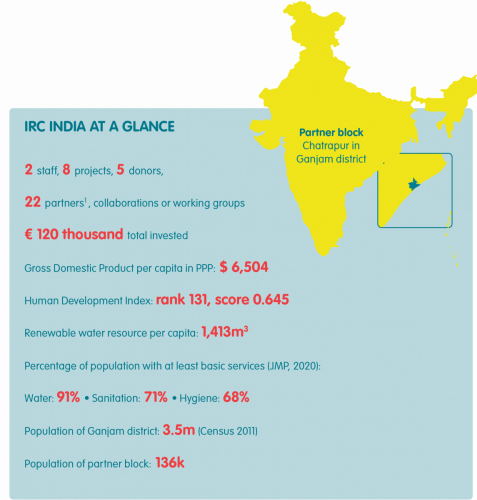
Strengthening institutions is key to sustainable services
Published on: 01/08/2022
"Panchayati Raj Institutions (rural local governments) play an important role in ensuring water, sanitation, and hygiene services, more so after the 15th Finance Commission guidelines (that recommend 60% of the rural local government funds to be spent on water and sanitation supply). It is, therefore, crucial that their capacities are developed to strengthen WASH systems."
- Shipra Saxena, WASH Specialist, UNICEF Odisha.
In India, national and state level governments are committed to ensuring water and sanitation services for everyone. The national government's flagship scheme – the Swachh Bharat Mission – is geared towards safe sanitation. While the national Jal Jeevan Mission scheme, and the Odisha state scheme – Buxi Jagabandhu Assured Drinking Water to All Habitation (BASUDHA) – are aimed at providing safe water.
But the success of these schemes depends on the capacity of institutions to deliver the services. The grassroot institutions, particularly the local government, play a key role in the planning, implementation, and monitoring of water and sanitation services. But training programmes for staff are often one-off, use dated content and are of limited value. A 2018 study by IRC and UNICEF in Odisha found that the knowledge, skills and attitude necessary to provide services steadily declined as they moved down the institutional hierarchy towards the grassroots. The Watershed project confirmed this gap.
In 2021, IRC supported UNICEF and the State Institute for Rural Development and Panchayati Raj (SIRD & PR), to develop and conduct trainings for the three tiers of rural local government. Making the training precise and easy to understand for a target group with low levels of literacy was challenging. The content is based on adopting a holistic and comprehensive approach to WASH, instead of looking at water, sanitation, and hygiene separately. It provides practical inputs for leveraging other development schemes/programmes for WASH services.
Developing the training material gave IRC the opportunity to work on institutional strengthening, focusing on the sustainability of services beyond infrastructure creation, as well as time-bound schemes using the 'leaving no one behind lens'. Plus, the development of this material was very timely as it would be used to train the newly elected local government representatives in 2022.
Footnotes
1 Number of partners, collaborations, or working groups with whom we worked closely on programme implementation in 2021.